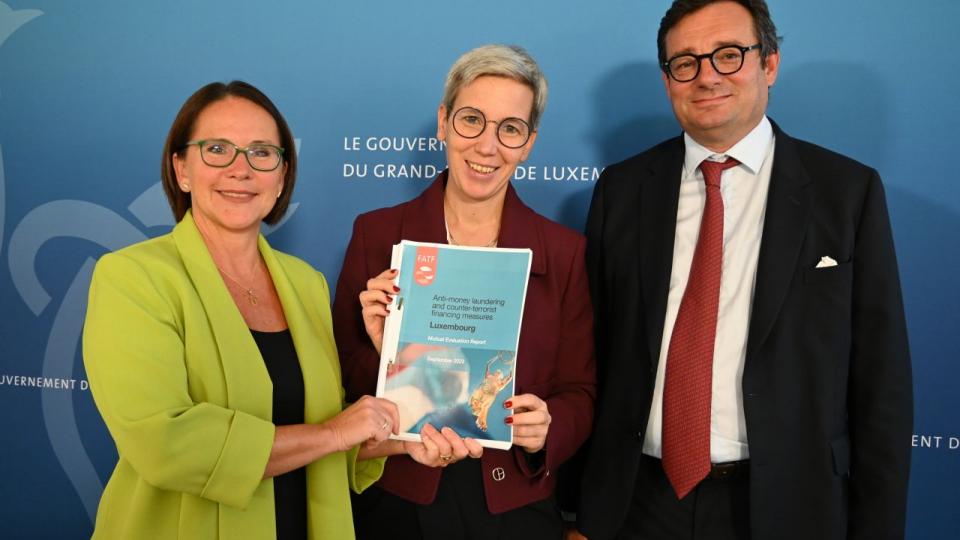
Luxembourg needs to make a bigger effort to supervise the non-financial sector and better scrutinize real estate firms, trust companies, notaries and services firms, the world’s top body to fight money laundering and the financing of terrorism said on Wednesday.
Releasing its long-awaited mutual evaluation report on Luxembourg, the Financial Action Task Force (FATF) acknowledged Luxembourg's firm anti-money laundering and counter-terrorist financing (AML/CFT) framework but also highlighted areas of improvement. The 302-page report serves as a comprehensive assessment of Luxembourg’s AML/CFT measures and offers a roadmap for the country to enhance its defences against financial crimes.
Both the Luxembourg government and financial sector supervisor CSSF issued statements underling the FATF report's “overall good result” for Luxembourg. Luxembourg in 2009 was placed on the FATF grey list, which means a country needs to improve its anti-money laundering and counter-terrorist financing measures to meet international standards. That warning has led to major changes in the decade that followed.
Though Luxembourg received praise for its nuanced understanding of money laundering and terrorist financing risks, and for adeptly utilising financial intelligence and international cooperation, FATF emphasised the need to amplify focus on money laundering investigations, asset recovery, and monitoring of non-profit entities and certain non-financial sectors.
‘Work to be done’
“Risk-based supervision of the non-financial sectors, such as trust and company services, real estate and notaries, is in the early stages and further work needs to be done,” FATF concluded.
The report follows the FATF's country inspection from November last year and its conclusions were discussed in June by the FATF in a plenary meeting. “Luxembourg has a very good idea of what it needs to do,” FATF president Raja Kumar told Investment Officer in the wake of that plenary meeting.
Considering Luxembourg's status as a major international financial nexus with extensive cross-border financial transactions, it's inherently at risk. FATF noted the nation's particular vulnerabilities within banking and investment realms. Tax crimes, corruption, and fraud are perceived as primary threats.
Concerns over FIU
The strength of Luxembourg’s AML/CFT system lies in its domestic cooperation and coordination. Moreover, Luxembourg authorities have prompt access to beneficial ownership data and are lauded for their international cooperation. However, concerns arise with Luxembourg’s Financial Intelligence Unit, CRF-FIU.
Luxembourg's financial intelligence unit “needs to ensure that it can continue to do so given its level of human resources and increasingly complex role,” the report said. “Its level of human resources and increasingly complex role give rise to concerns about the CRF-FIU ability to continue effectively performing its various functions going forward.”
The FATF report further stresses the necessity for Luxembourg to concentrate on sectors like real estate and trust and company services. More complex money laundering cases should also be better detected, investigated, and prosecuted. Despite certain authorities in Luxembourg demonstrating an awareness of terrorist financing risk, the FATF emphasises that Luxembourg must articulate to both public and private sector stakeholders the potential exploitation of its status as an international financial centre for large-scale terrorist financing, referred to as TF.
Reporting levels don't reflect risk profile
“The quality and relevancy of TF reporting by some obliged entities is extremely low,” the report said. “Overall, this reduces the reporting levels related to ML/TF suspicion and does not reflect Luxembourg’s risk profile as an international financial centre.”
An increased risk-based oversight is recommended for the non-profit organisations sector. The FATF suggests outreach efforts to address the sector's limited understanding of terrorist financing risk.
In terms of domestic asset recovery, Luxembourg needs to bolster its efforts, FATF said. Nevertheless, the country has been effective in addressing foreign requests, using tools to manage assets tied to overseas crimes. Despite efficiently implementing targeted financial sanctions for terrorist financing within a day, recently introduced measures require further evaluation for effectiveness.
While Luxembourg proactively identifies terrorist financing activity, no investigations have resulted in prosecutions or convictions, highlighting a potential area of concern, said FATF.
Both the Luxembourg government and financial sector supervisor CSSF issued statements underling the FATF report's “overall good result” for Luxembourg. Finance Minister Yuriko Backes said the FATF report “confirms the robustness and integrity of our financial centre, reinforcing its reputation on a global scale.” The report is released in the middle of an election campaign, just before national elections on Sunday 8 October.
The FATF report “clearly shows that the financial centre's maturity is the result of rigorous supervision and an effective anti-money laundering system,” Backes said, according to a government statement following Wednesday's press conference. “These results also highlight the government's judicious choices. It is essential to capitalise on these successes while resolutely pursuing the path of transparency and compliance.”
Justice minister Sam Tamson, said the FATF recognition of Luxembourg's efforts “strengthens Luxembourg's credibility on the international stage.”
“Today, the signal is clear to criminals who would like to take advantage of the system and the financial players in our financial centre. Luxembourg is not a haven for funds of illegal origin and the financial institutions, financial and investment instruments or other instruments . Luxembourg cannot be used to launder funds from criminal activities,” she said.
Regular monitoring
Financial supervisor CSSF noted that the Grand Duchy has achieved a “good overall result” and recognised that Luxembourg now has been placed under “regular monitoring” by the FATF, which it said “corresponds to the best possible result following a mutual evaluation”.
“Even if the report highlights in particular that more efforts still need to be made regarding ML/FT suspicion reports to be communicated to the Financial Intelligence Unit, it underlines that professionals have made significant investments in compliance and concludes that these professionals generally have a solid understanding of their professional AML/CFT obligations and a good understanding of ML/TF risks,” said the CSSF statement.
This article was updated on 28 September to include reactions from the government and the CSSF.
Related articles on Investment Officer:
- FATF: ‘Luxembourg has a very good idea of what it needs to do’
- Luxembourg, awaiting FATF visit, is under AML spotlight



